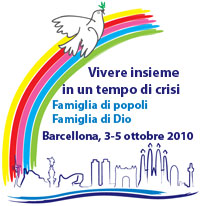Journalist, “NHK Broadcasting Corporation”, Japan
|
Coverage, Optimism and its Theme
In Japan, the main religions are Buddhism, Shintoism, New Religions, Christianity. If we add the number of believers in Buddhism and Shintoism, its number exceeds the population of Japan. It means many Japanese consider themselves as polytheist. Actually they are careless about which religion they believe in.
Besides, I have to emphasize that Japan is a country which has a relatively strict separation of Religion (Church) and State. And it moves certainly toward the secularization of the society.
In the whole world, Japan is one of the most diversified countries in media-communications. You can find there a flood of newspapers, TV channels, cable-Televisions, publications, and websites. Most of religions or denominations have their own official organs and websites. TV channel supported by specific religions is practically absent due to some economic reason. Therefore, very little influence on people.
Although media communications in Japan is diversified and active, huge media-communications, such as TV station, seldom cover topics of religions. One of the reasons comes from the institution of separation of Religion (Church) and State. But, apart from the traditional events, like feasts, there is indifference or even cautiousness of people with mass media’s message about religion. As a consequence, media-communications including websites do not seem to fill any positive role in the promotion of the value of Life. As to the news coverage of Catholic Church, for instance, it is generally limited to a short story of the greeting of New Year’ Day or Christmas , and it does not follow after the Life of those people.
Although there is a strong feeling of avoidance of news or program which may treat specific religion, nobody is satisfied with the lack of message about the value of Life. People are waiting more information about loneliness of the aged, loss of self-confidence of youth, social service for person who is ill, suicide, unemployment, human rights, forest conservation, and so on.
I do not think that this situation applies only in Japan. And I would like to not be pessimistic about this. Let me explain the reason of my optimistic view.
In religion, we express our faith through our way of life. In fact, this “life” could be exactly the subject of media-communications. Substantially religion and media communications are dealing with same theme. For instance, the role of media-communications is the concrete presentation of people’s life, live in diversity. Documentary programs and interviews, live programs are media’s strong points, and such programs focus people’s living day in day out. Thus, media-communications , which does not necessarily be managed by religious organization , can express clearly sincere life of people, even it puts in a various appearance. Even if media-communications do not air the place of worship, Can’t we say they report us a part of truth of faith or religion? Yes, of course it does. I believe that through the coverage of the sincere life of people, media-communications, like also the inter-religious dialogues, can have a potential power or possibility of sharing an universal value with others.
So, how should we confront these media-communications?
It is well known that TV programs or animations are produced by editing the pictures, and “editing” has its own particular language of image. This “language” is very important point for both religion and media-communication. I say. Religion and media communication use their own language, and their language is not understandable for each other. That is the point. Therefore, The first step to do is to detect and acquire common languages with media communications and religion. We need to make more effort translating the terms of religion, the message of the truth of faith and values of spirituality, toward the words of media-communications. But to realize it, it is important to say that more lay journalists of the different religions should be appointed to work in this complex field. At the same time, those users who enjoy information and program of media-communications needs to trained to select wisely the information and news which they need.
I would like to conclude my contribution by making reference to the so-called Global Communication. I am optimist. Global Communication is a means to communicate universally the information and values of Life to people. Therefore, we need to increase enormously the amount of translation which is truly needed. Translation could be understood like I mentioned above. Perhaps, translation is not a perfect tool, but could be the first step to realize the Global Communication which has a potential power to deepen mutual understanding and promote not only the inter-religious dialogue but also “inter-faith dialogue”. We do not need to rebuild the Tower of Babel. Because we know what happened to it.
|








 Barcelona 2010
Barcelona 2010 